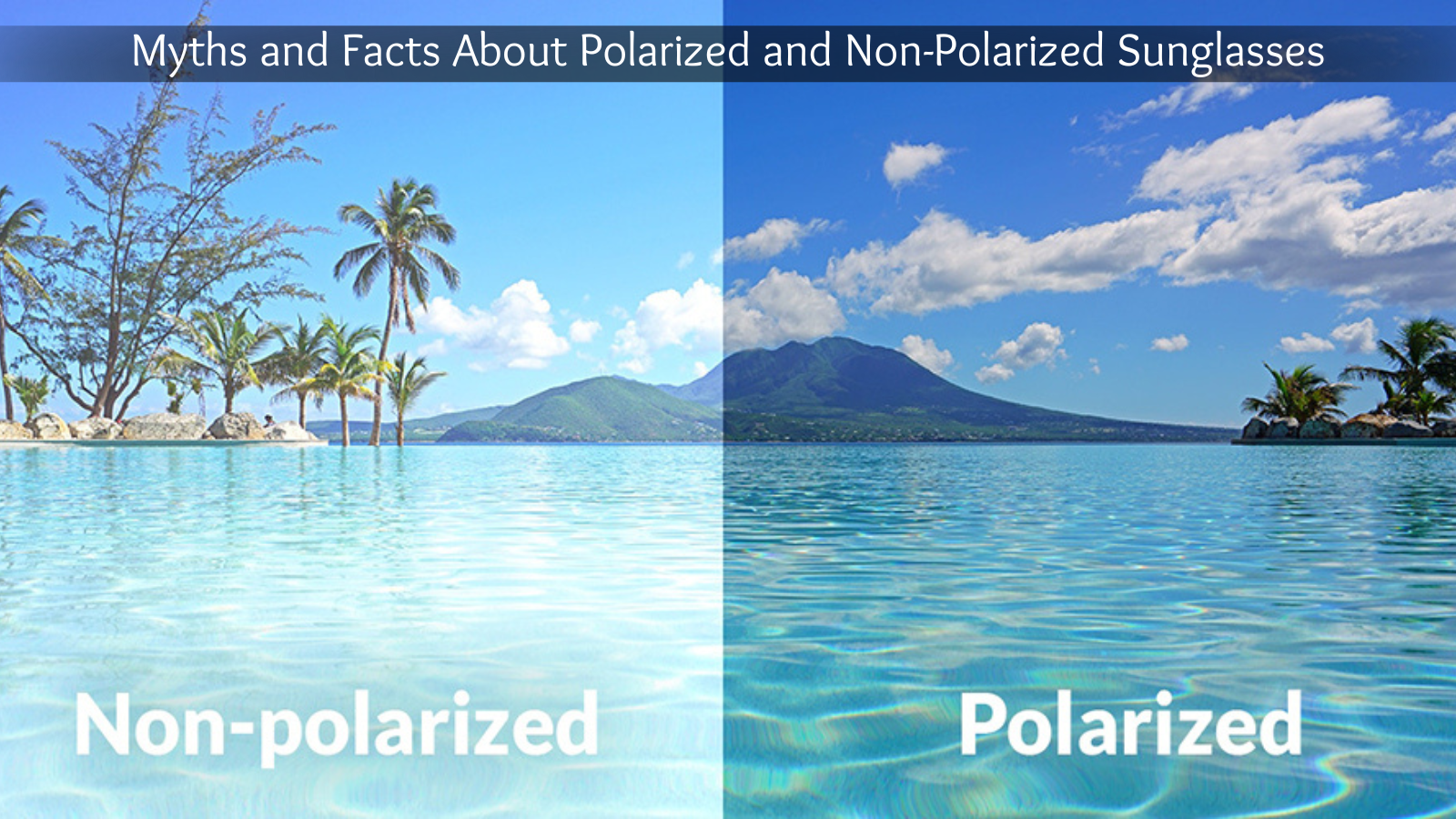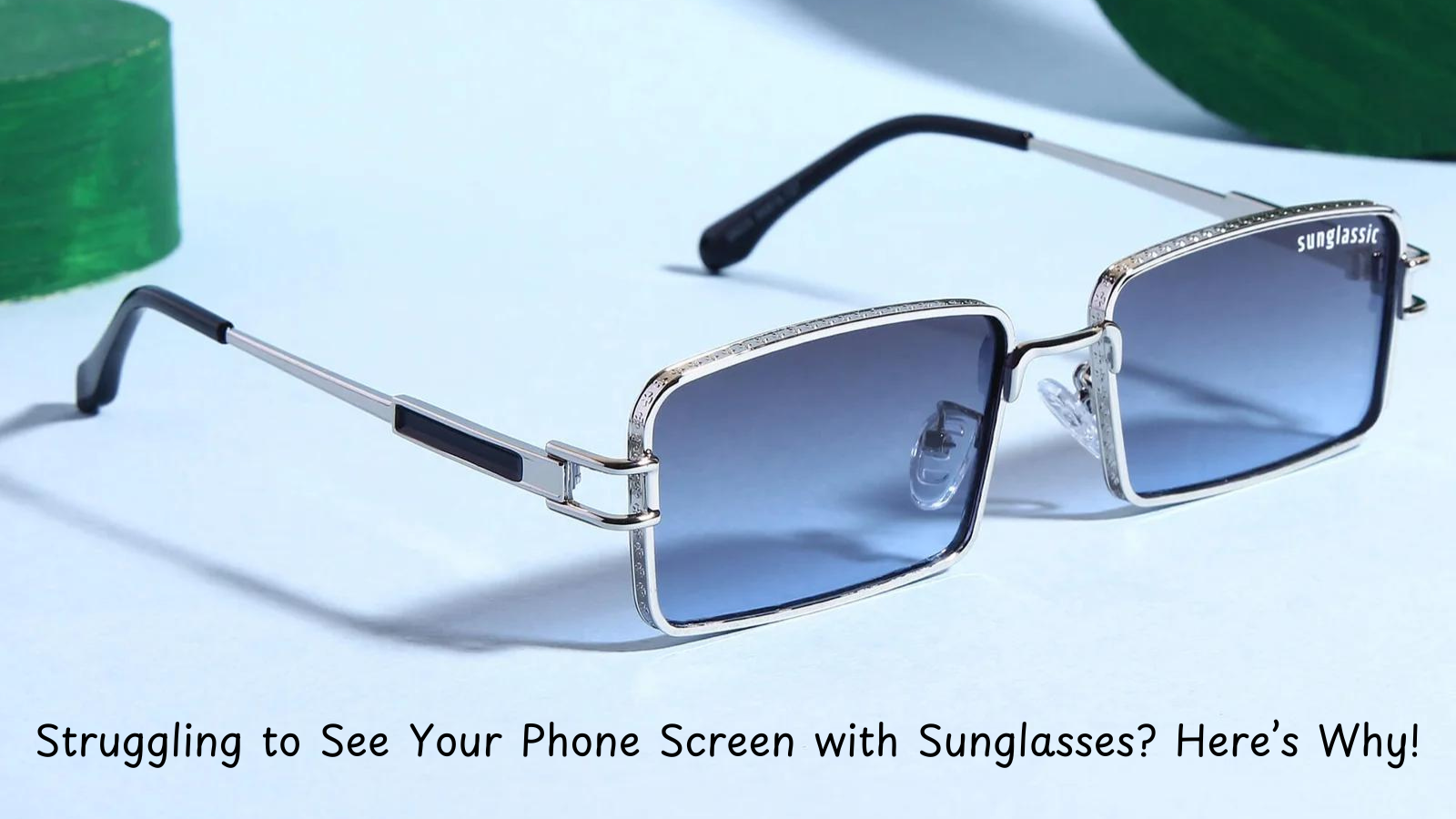
Myths and Facts About Polarized and Non-Polarized Sunglasses
When shopping for sunglasses, one question often comes up: should you go for polarized or non-polarized lenses? While polarized lenses have grown in popularity due to their advanced glare reduction and visual clarity, non-polarized lenses remain a staple for everyday use. There's a lot of misinformation around these two types of sunglasses, leading to confusion when making a purchase. This blog will help clear the air by busting common myths and uncovering the facts about polarized and non-polarized sunglasses. By the end, you’ll have all the information needed to choose the best sunglasses for your needs.
Understanding Polarized vs. Non-Polarized Sunglasses
Before we dive into the myths and facts, it's crucial to understand the key differences between polarized and non-polarized sunglasses.
Polarized Sunglasses:
Polarized sunglasses are equipped with a special filter that reduces glare from surfaces like water, roads, and glass. This filter helps block out horizontal light waves while allowing vertical light waves to pass through. As a result, the wearer experiences better visual clarity, reduced eye strain, and enhanced comfort, especially in bright outdoor environments.
Non-Polarized Sunglasses:
Non-polarized sunglasses, on the other hand, provide basic protection from the sun by reducing the intensity of sunlight that reaches your eyes. While they do reduce the amount of light entering your eyes, they do not filter out glare as effectively as polarized lenses do. Non-polarized lenses are typically used for general everyday wear, providing UV protection but lacking the advanced filtering technology of polarized lenses.
Common Myths and Facts About Polarized and Non-Polarized Sunglasses
Myth 1: Polarized Lenses Offer Better UV Protection
Fact:
One of the most common myths is that polarized lenses provide superior UV protection compared to non-polarized lenses. In reality, polarization and UV protection are two separate features. Polarized lenses are designed to reduce glare, not block UV rays. Whether sunglasses are polarized or not, they can still offer 100% UV protection if they are properly manufactured.
When shopping for sunglasses, always look for labels that specify 100% UV protection or UV400 protection, regardless of whether the lenses are polarized or non-polarized. UV protection is crucial in preventing long-term eye damage, such as cataracts and macular degeneration.
Myth 2: Polarized Sunglasses Are Only Useful for Water Activities
Fact:
While polarized sunglasses are incredibly effective for water-based activities like fishing, boating, and swimming, they are also beneficial for various other environments. Polarized lenses help reduce glare from all reflective surfaces, including snow, roads, and glass. This makes them ideal for activities like driving, skiing, or simply spending time outdoors in bright sunlight.
If you’re someone who spends a lot of time outdoors, regardless of the setting, polarized sunglasses can enhance your visual comfort and reduce eye strain.
Myth 3: Non-Polarized Sunglasses Are Cheaper Because They're Inferior
Fact:
The misconception that non-polarized sunglasses are inferior or less effective stems from a misunderstanding of their purpose. Non-polarized lenses are not necessarily cheaper due to poor quality; they are simply designed for different needs. Non-polarized sunglasses can still offer excellent protection against UV rays and are suitable for general wear, particularly in situations where glare reduction isn’t a priority.
For many people, non-polarized lenses work perfectly well for everyday activities like walking, shopping, and casual outdoor use. The price difference often comes down to the added technology of polarization, rather than a disparity in quality.
Myth 4: Polarized Sunglasses Are Always Better for Driving
Fact:
Polarized sunglasses can significantly reduce glare when driving, particularly on bright days when sunlight reflects off the road or other cars. However, they may not always be the best choice in certain driving conditions. For example, polarized lenses can make it harder to read digital screens on car dashboards, GPS devices, or smartphones. In low-light conditions, such as during dusk or foggy weather, polarized lenses might also reduce visibility slightly.
Therefore, while polarized sunglasses are generally a good option for driving in bright conditions, they may not always be the best choice in every driving scenario.
Myth 5: Non-Polarized Sunglasses Don’t Reduce Eye Strain
Fact:
Non-polarized sunglasses still reduce eye strain by lowering the overall brightness of your environment. They filter out some of the intense light, making it more comfortable for your eyes in sunny conditions. While polarized lenses may offer better glare reduction, non-polarized lenses still do an effective job of reducing the overall light intensity, helping prevent squinting and eye fatigue.
If glare isn’t a major concern for you, non-polarized sunglasses can still offer a significant improvement in visual comfort compared to going without sunglasses altogether.
Myth 6: Polarized Sunglasses Distort Vision
Fact:
Polarized lenses don’t distort vision but instead enhance clarity by reducing the blinding glare from reflective surfaces. However, because they block certain horizontal light waves, they can make certain objects, such as digital screens, appear darker or harder to read. This is especially true for LCD and LED screens, which are commonly used in smartphones, GPS devices, and car dashboards.
While this can be inconvenient in certain situations, polarized lenses generally improve overall visual clarity in bright, reflective environments.
Myth 7: Non-Polarized Sunglasses Are Useless in Snowy Conditions
Fact:
Non-polarized sunglasses can still be effective in snowy conditions by reducing overall brightness and providing UV protection. However, because snow reflects a significant amount of sunlight, creating intense glare, polarized lenses are often the better choice in such conditions. Polarized lenses help reduce the glare from the snow, providing greater comfort and clarity.
That said, non-polarized lenses can still protect your eyes from UV rays in snowy conditions, making them a viable option if glare isn’t a major concern.
Which Should You Choose: Polarized or Non-Polarized Sunglasses?
The choice between polarized and non-polarized sunglasses ultimately depends on your lifestyle and specific needs. Below, we outline a few scenarios where each type of sunglasses might be the better option:
When to Choose Polarized Sunglasses:
-
Water Activities:
If you spend a lot of time by the water—whether fishing, boating, or swimming—polarized sunglasses will greatly reduce the glare from the water’s surface, improving your visual comfort and clarity. -
Driving:
Polarized sunglasses are excellent for driving in bright sunlight, reducing the glare from the road and other vehicles. However, be mindful of their effect on digital screens. -
Outdoor Sports:
Whether you’re skiing, hiking, or running, polarized lenses can help reduce the glare from snow, roads, and other reflective surfaces. -
Extended Sun Exposure:
If you spend long hours in bright sunlight, polarized lenses offer enhanced comfort by reducing glare and minimizing eye strain.
When to Choose Non-Polarized Sunglasses:
-
Everyday Use:
If you’re looking for sunglasses to wear while walking, shopping, or spending casual time outdoors, non-polarized sunglasses are a practical and cost-effective option. -
Driving in Low-Light Conditions:
Non-polarized sunglasses may offer better visibility during overcast days, fog, or dusk, as they don’t block as much light as polarized lenses. -
Screen Visibility:
If you rely heavily on reading digital screens while wearing sunglasses, non-polarized lenses won’t interfere with your ability to see LCD or LED displays.
Final Thoughts
Both polarized and non-polarized sunglasses serve different purposes and offer unique benefits. The decision on which type to choose comes down to your specific activities and environments. Polarized lenses excel at reducing glare from reflective surfaces, making them ideal for outdoor sports, driving, and water activities. Non-polarized sunglasses, while lacking in glare reduction, still offer excellent UV protection and are perfectly suited for everyday wear.
By understanding the facts and debunking the myths about polarized and non-polarized sunglasses, you’ll be better equipped to make an informed decision that enhances both your vision and your style. At Sunglassic.com, we offer a wide range of both polarized and non-polarized sunglasses, ensuring you find the perfect pair to suit your needs.
SHOP BY SHAPE
WORN BY OVER 200.000 PEOPLE WORLDWIDE








Leave a comment
This site is protected by hCaptcha and the hCaptcha Privacy Policy and Terms of Service apply.